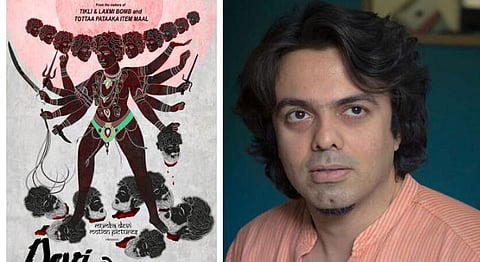
- HOMEGROWN WORLD
- #HGCREATORS
- #HGEXPLORE
- #HGVOICES
- #HGSHOP
- CAREERS
- ABOUT US
- CONTACT US

In the Indian and particularly the stereotypical Hindu psyche, a goddess is usually a beautiful, light-skinned woman usually adorned heavily with jewels, probably a motherly figure and definitely a ‘pious’ woman in all our ways. The concept of piety and more importantly ‘virginity’ extends to goddess pantheons in other religions too. On the other hand, a hero is usually a hyper-masculine character who can basically solve all the problems in the world with a click and probably also wears his underpants over his trousers. But what if we were to imagine a sex worker as a goddess and a sex addict as a hero? Most of us would probably write it off as poor analogy, or some of us, for instance, people like filmmaker Aditya Kripalani, best known for films like Tikli And Laxmi Bomb (2017) and Tottaa Pataka Item Maal (2019), would identify her sanctity in her courage and his strength in his ability to save himself from his own fears and frailties.
Kripalani’s upcoming film Devi Aur Hero, featuring Chitrangada Satarupa as the urban sex slave with Disassociative Identity Disorder (DID), Kaalie Ghosh and Vinay Sharma as the 45-year-old Vikrant Sarawat, a counsellor with sex addiction issues, does exactly that when it shows the two damaged characters coming together to save themselves and each other. The film that recently won the NETPAC Award at the 25th Kolkata International Film Festival takes a Campbellian approach to the idea of the ‘hero’ and the ‘goddess’. It also opens up with Joseph Campbell’s quote from his Hero with a Thousand Faces (1949), “The cave you fear to enter holds the treasure you seek, which is true for both of them.”
By his own acknowledgement, Kripalani’s past films have only thrown the black light at men, and even though they have shown supremely strong female friendships and women avenging the violence afflicted upon them, they haven’t had much for men and other genders to take out of. Which is why, he wanted to make something that could give the Indian man the opportunity to get inside the protagonist’s head and probably have some kind of catharsis, or probably think about the kind of violence men end up foisting and what could be a probable solution to it. One of Kripalani’s biggest influences is Macbeth from Shakespeare’s Macbeth who could have had everything had he been able to fight his inner demons, and that’s exactly what the filmmaker who says that he preferred Dev.D (2009) over the original because “Dev.D was able to look at that person outside and actually fall in love and get beyond his self-wallowing and self-obsession”, wanted his male protagonist to do. That’s how Devi Aur Hero, which had somewhat been imagined as an Indian version of Kill Bill with Goddess Kali became a film about a woman who escapes an urban sex-prison and finds herself with a therapist who can’t help but look at her sexually because of his addiction issues. What ensues further is her struggle with DID and her three ‘selves’, several blackouts, and her struggle to find strength and come to terms with her past as she fights abuse and deep-rooted chauvinism to evade her rapists who are actively seeking her back. She is assisted in her endeavour by Vikrant who is a healer with his own issues.
Kripalani says that with every movie, his idea of feminism keeps evolving and while initially, to him, feminism was only about women, he has recently started thinking about how the same systems affect men and what would a gender-equal world look like. His earlier creations have also had characters realising that they are one and the same at the end of the day and that these constructs fall apart if situations are channelled in a particular way.
The film also has a very strong mental health angle to it. To the filmmaker who has been seeing a counsellor since his early days because his school had one, the coolest of people aren’t those who wear ‘cool’ looking stuff but are those who dare to deal with themselves and go to a counsellor to care for their mental health. He was struck with the idea that his counsellor could also have her own issues and she could also be seeing a counsellor for herself. Thus, according to Kripalani, this film is about a lot of firsts—a suffering healer seeking to be healed and more importantly, a story that talks about sex and sexuality seriously unlike other mainstream films that have dealt with the issues previously using elements of humour and masala.
Devi Aur Hero is imbued with contemporary sounds and a visual landscape that is both chaotic and organized—just like the mental landscapes of both the story’s protagonists. One to pique everyone’s interest and perhaps even herald some massive changes in the Indian society, Aditya Kripalani’s Devi Aur Hero is one to look out for.
Find more information here.
Feature image courtesy of Asianlite
If you liked reading this, we suggest you read:
